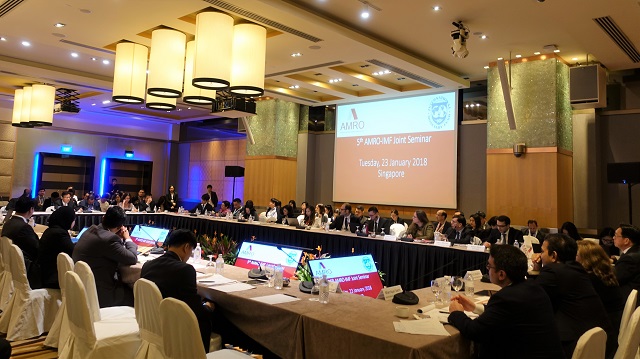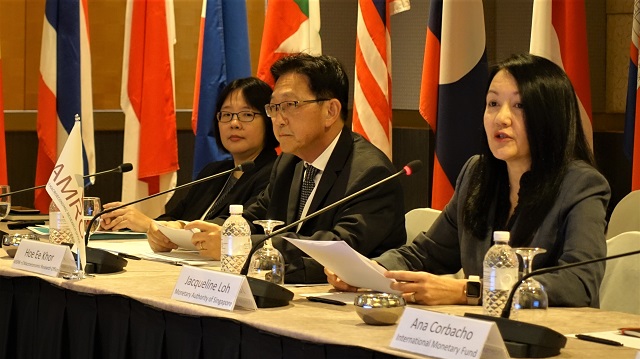
Representatives from ASEAN+3 member authorities, the private sector, and international financial institutions attend the 5th AMRO-IMF Joint Seminar in Singapore on January 23, 2018.
Singapore, January 23, 2018 – The ASEAN+3 Macroeconomic Research Office (AMRO) and the International Monetary Fund (IMF) today co-hosted the 5th AMRO-IMF Joint Seminar in Singapore. This annual event is an important platform for AMRO to consult various stakeholders on its ongoing studies, discuss regional macroeconomic and financial issues, and strengthen its collaboration with the IMF.
Participants included representatives from ASEAN+3 member authorities, the private sector, and other international financial institutions. Ms Jacqueline Loh, Deputy Managing Director of the Monetary Authority of Singapore (MAS), delivered the opening remarks

Ms Jacqueline Loh (first from right), Deputy Managing Director of the Monetary Authority of Singapore (MAS), delivers the opening remarks at the 5th AMRO-IMF Joint Seminar.
In the first session facilitated by AMRO Chief Economist Dr Hoe Ee Khor, AMRO presented a broad review of how integration into the global economy has been a key driver of ASEAN+3 countries’ growth, and what the region could do to augment its primarily export-led strategy in order to achieve further catch-up and greater resilience. In the second session led by Ms Ana Corbacho, Division Chief at the IMF, participants discussed economic cycles and macroeconomic policy synergies.
This Joint Seminar also served as a consultative session for AMRO on the theme “Resilience and Growth in a Changing World”, which is also the theme of AMRO’s upcoming flagship report ASEAN+3 Regional Economic Outlook (AREO) 2018. This seminar provided AMRO with valuable comments and insights on this theme from ASEAN+3 member authorities, as well as specially-invited participants including senior policymakers, academics and economists from the region.
The AREO 2018 will be launched at the side of the ASEAN+3 Finance Ministers and Central Bank Governors Meeting in Manila in May 2018. As an annual flagship publication, the report covers both the near-term regional economic outlook and a thematic chapter of policy interest.
